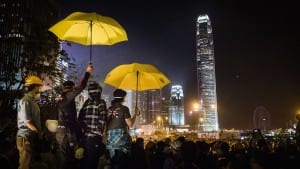One Country, Two Systems: an unfinished experiment?
By Thomas Hughes, on 12 February 2016
In this lecture by the former Dean of Law of the University of Hong Kong, Professor Johannes Chan, we were taken on a whistle-stop tour of the history of the legal and political confrontations between Hong Kong and the mainland government of the People’s Republic of China (PRC).

Protesters during the Umbrella Movement. By Pasu Au Yeung via Wikimedia Commons
Most people’s recent images of Hong Kong are dominated by the “Umbrella Movement” of 2014. The mostly student protestors were pushing for the Standing Committee of the National People’s Congress (NPCSC) in mainland China to allow a free selection of candidates for the Hong Kong Chief Executive and Legislative council.
This was the culmination of increasing tensions between the two regions as they have spent the 20 years since Hong Kong was returned to China testing the boundaries of their relationship.
Since the protests, the NPCSC has been looking to exercise greater control over Hong Kong. Publishers and journalists have disappeared and academia has been interfered with. So what has gone wrong in this relationship?
The first decade.
Hong Kong’s rule of law is built around British style of Common Law. The Hong Kong Basic Law outlines the separation of powers between the executive, legislature, and judiciary.
China, however, uses a combination of Chinese Socialism and Civil Law with “Chinese characteristics” and all the power, including judiciary appeal, is based in the NPCSC. A lot of the tension, Professor Chan argued, has been about working out how these two legal systems can work together.
Professor Chan had a lot of in-depth examples of specific legal battles between the mainland and the legislative and the judiciary in Hong Kong.
An interesting example was a dispute early after Hong Kong had been handed back to China. The dispute was on whether children born to parents who had the right to abode in Hong Kong automatically had right of abode there. The Hong Kong Court of Final Appeal decided that the Basic Law said that they did.
This would have immediately meant that 300,000 people living in mainland China would have been eligible for permanent residence status in Hong Kong, and possibly many more would have applied for the right to abode.
The NPCSC reinterpreted the relevant parts of the Basic Law, denying those born outside of Hong Kong this right. There were protests and a great deal of anger at this decision, and it was appealed. However, the Hong Kong Court of Final Appeal ruled that the NPCSC decision was constitutional.
This all raised questions as to whether the Hong Kong judiciary was still independent. It created a precedent that even decisions by Hong Kong’s highest court could be overruled.
However, over the rest of the decade the Hong Kong courts continued to interpret its citizen’s rights generously without interference from the mainland.

Umbrellas during the Umbrella Movement. By Pasu Au Yeung via Wikimedia Commons
The past decade.
During the past decade the PRC’s power and global status has grown and it has become more repressive towards its own people and Hong Kong.
However, Hong Kong has also grown and tourists from the mainland have been flooding in. This clash of cultures has created more tensions.
In 2013, the PRC failed to force through patriotic education in Hong Kong, which many argued was simply brainwashing. In 2014, the PRC created a white paper that essentially stated that Hong Kong’s power is not unique to Hong Kong but instead flows from the PRC government.
The goal of this was to point out that Hong Kong could rely on its autonomy only so long as central government policy was not threatened.
In 2014 the PRC also set out its guidelines for the full elections set to take place from 2017. The PRC would allow full elections but candidates could only be approved by a nominations committee of 1,200 people.
Essentially, this meant that the Hong Kong people could elect anyone, as long as they were pre-approved by the PRCSC.
This led to the “Umbrella Movement” protests that blocked major thoroughfares for 79 days. The PRC’s response to this was interesting, as it was categorised by a no compromise, no engagement stance, and eventually counter-demonstrations.
While the changes were eventually abandoned, it means that no direct elections will be held until 2024. The PRC won’t let the battle end here.
This year, they implemented Youth Cadets, which has been argued is another attempt at brainwashing. They have also been quick to subvert the narrative of the demonstrations, suggesting that they were the result of foreign influence.
How will it end?
Professor Chan argued that even though the protests weren’t as successful at forcing through full universal suffrage as initially hoped, they did create a sense of civil enlightenment among the youth of Hong Kong, who now recognise that they might have to keep fighting for their rights.
While the One Country, Two Systems ideal is looking somewhat precarious, Professor Chan argued that modern China needs a liberal, stable Hong Kong if it is to continue to grow.
One Response to “One Country, Two Systems: an unfinished experiment?”
- 1
 Close
Close


one of the two have to give in, running two system is just going to cause friction and escalate to more conflict.